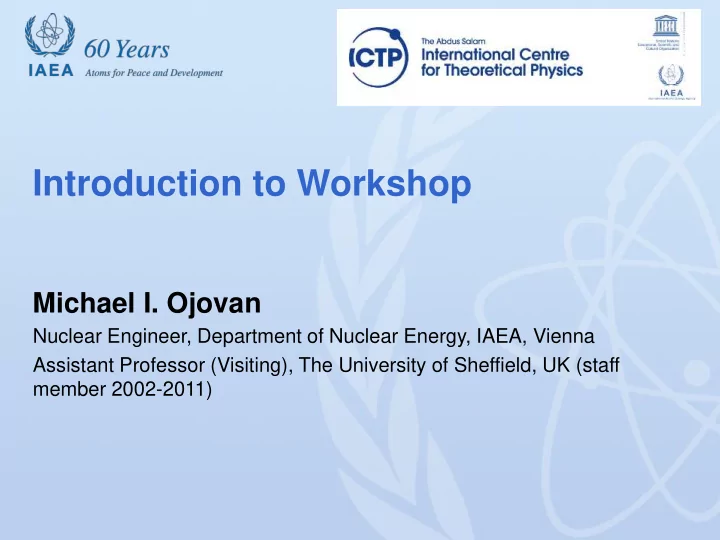

Introduction to Workshop Michael I. Ojovan Nuclear Engineer, Department of Nuclear Energy, IAEA, Vienna Assistant Professor (Visiting), The University of Sheffield, UK (staff member 2002-2011)
2
3
4 https://nucleus.iaea.org/sites/connect/IPNpublic/Pages/default.aspx
Radioactive Waste inventory is predominantly from peaceful use of: Research Reactors; NPP ’s; and Sealed Radioactive Sources. 5
Nuclear power Operating Operating with plans Considering nuclear to expand power introduction 1 st NPP Under Operating and Decided to introduce Constructing Construction nuclear power Status: Q2-2014 6
Nuclear power Status: Q2-2014 First nuclear power plant Belarus, Turkey, UAE ordered Decided and started preparing Bangladesh, Vietnam, Egypt, Jordan, Nigeria, Poland infrastructure Active preparation with no Chile, Indonesia, Malaysia, Morocco, Thailand, Saudi Arabia final decision Albania, Algeria, Croatia, Estonia, Ghana, Kazakhstan , Kenya, Libya, Considering nuclear power Mongolia, Niger, Syria, Sudan, Tunisia, Uruguay programme Benin, Cameroon, Congo, Laos, Malawi, Namibia, Oman, Qatar Not planning, but expressed Philippines, Singapore, Sri Lanka, Tanzania, Uganda interest in considering issues Operating Operating with plans Considering nuclear to expand power introduction 1 st NPP Under Operating and Decided to introduce Constructing Construction nuclear power 7
Sources of Radioactive Waste Modern life is filled with technology whose production or use may generate radioactive waste. This waste is an unavoidable by-product when radioactive material is used for electricity production and in nuclear technology for beneficial practices in medicine, agriculture, research and industry. 8
Application in Research and Industrial, agricultural and other Medical applications Education applications • • • in vitro radioassay and calibration production and labelling of • research development of radio-labelled compounds • • compounds in vivo use of manufacture of radioactive sealed • radiopharmaceuticals study of metabolic, toxicological sources • • radiotherapy using sealed or environmental pathways use of radioactive material for • sources for brachitherapy or clinical processes and scientific measurements/ calibration • teletherapy applications oil exploration and well logging • • basic research (physics, process and plant contro l • chemistry, engineering) non- destructive testing and QC • water treatment • sterilization • food irradiation Consumer products • smoke detectors • luminous devices • lightening rods 9
Radioactive waste to be safely managed 10
All nations are responsible for the safe & secure management of their national inventory. Radioactive waste management may be carried out locally (on the site of origin, waste generator), at a national and/or regional waste management facility, or a combination of both. 11
There are requirements, standards, guides and technical reports for all activities/facilities irrespective of size and complexity. 12
Collection of Technical Documents
WS Purpose: The Workshop aims to gain awareness on the most recent findings of research into radiation effects in nuclear waste forms and their role for waste storage and disposal. It aims to contribute to the transfer of specific knowledge to Member States towards their capacity building efforts and competence in nuclear waste immobilisation and disposal. 14
WS Focus: The workshop will focus mainly on experts on radiation effects in materials to explore the potential of both experimental and theoretical/computational approaches aiming to understand the consequences of irradiation of materials under extreme conditions, particularly focusing on long-term irradiation conditions envisaged for nuclear waste forms containing long lived fission products and actinides. 15
WS Topics: • Fission and fusion power generation : challenges in the use of materials; • Role of irradiation at different stages of material use in the nuclear industry; • Nuclear waste forms and envisaged irradiation storage and disposal conditions; • Behaviour of materials containing actinides and long lived radionuclides; • Experimental techniques to investigate and simulate radiation effects; • Theoretical /computational methods to investigate and simulate radiation effects; • Performance of nuclear waste forms accounting for radiation effects. 16
WS modus operandi Presentations by the invited lecturers: Presentations by the IAEA lecturers: National presentations • The scientific report in the context of the national waste management. • 20 minute slots to include time for discussion and questions / answers (5 mins). 17
What to highlight in the national reports • Research of the individual or research group, giving a summary of important or recent results on wasteform, spent fuel or nuclear materials of relevance to radiation damage studies, typically from own research programmes. • The scientific report in the context of the national waste management strategy (first give a brief overview of the types of waste produced and managed in your nation state and the current status of waste conditioning and disposal practice. 18
Proceedings arising from the workshop Participants should prepare an extended abstract of up to six pages for each presentation at the meeting, using the template provided. This should be submitted on the first day of the conference. Extended abstracts for scientific reports will be peer reviewed by the organising committee and feedback provided during the meeting to participants. The accepted extended abstracts will be published as an IAEA TECDOC. 19
How to get the most out of WS? This workshop belongs to you and its success rests largely with you! • Say what you think; • Enter into the discussion, enthusiastically; • Don't be shy asking questions; • Ask for clarification or more explanation; • Make comments. Be open to reveal concerns, problems, challenges! • You can challenge the lecturers; • Be patient with other members; • Appreciate others point of view; Avoid private conversation while someone else is speaking! 20
Have a good Workshop! Thank you!
Recommend
More recommend